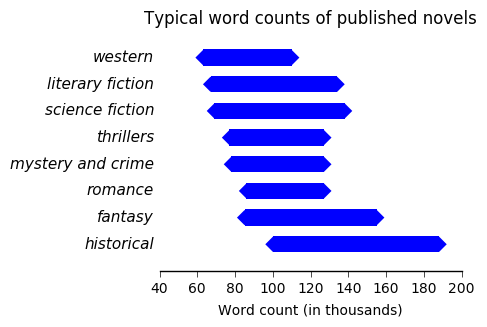5 Controversial Style Rules: Outdated or Not?
Some grammar rules exist only in textbooks, and are rarely applied in reality. Others were once widely followed, but have now fallen into disuse. Still other rules are still very much de rigueur, and breaking these rules will cause slush pile editors to discard your manuscript without hesitation. How can you tell which rules to follow and which rules you can safely ignore? How do you decide which style guides to believe? One approach is to study current usage in published literature.
In this post, I present statistics drawn from analysis of 110 professionally published novels from the 19th, 20th and 21st centuries, containing a total of 7 million words. We'll take a look at a series of oft-discussed, controversial grammar rules, and examine whether published authors follow these rules in practise.

Photo by Clark Young on Unsplash
Never end a sentence with a preposition - IGNORE
Prepositions are words such as 'with', 'in', 'about', 'on', most often used to show relationships in time or space, or between two nouns. The Cambridge Dictionary has a good explanation here.
According to this rule, you should rearrange each sentence so the preposition is not at the end. For example:
"This is a good philosophy to live by" becomes "This is a good philosophy by which to live".
"Here's a song I often listen to" becomes "Here's a song to which I often listen".
Following this rule tends to create ugly and convoluted sentences. Winston Churchill (anecdotally) called it "the type of errant pedantry up with which I will not put".
In reality, published authors regularly end sentences with prepositions, and have been doing so for centuries. Some examples include:
- It was the very circumstance he could have wished for. (Emma - Jane Austen)
- A detailed exhibition of her emotions was all that she had counted upon. (A Room with a View - E.M. Forster)
- Another agreed that there was nothing to live for. (Paradise - F. Scott Fitzgerald)
Don't hesitate to end your own sentences with a preposition, if that seems like the most natural choice.
Never start a sentence with a conjunction - IGNORE
This rule is usually taken to apply to coordinating conjunctions, mainly 'but', 'and', 'so', and 'or', and not subordinating conjunctions such as 'before', 'because' or 'although'.
Again, this rule is rarely followed in published literature. 5 to 6% of sentences in the published novels in my sample set begin with one of the conjunctions 'but', 'and', 'so', or 'or'. Here are some examples:
- But here there was nothing to be shifted off in a wild speculation on the future. (Emma - Jane Austen)
- And the old lady pottered off gleefully. (Sons and Lovers - D.H. Lawrence)
- But Sunday had only passed silently along the front like a shadow, and had sat in the central seat. (Thursday - G.K. Chesterton)
- But as Amory had loved himself in Eleanor, so now what he hated was only a mirror. (Paradise - F. Scott Fitzgerald)
Opening sentences with a conjunction is a useful technique for dramatic emphasis or sentence rhythm variation. Don't hesitate to make use of this tool in your own work.
Don't use split infinitives - (MOSTLY) OBEY
The infinitive of a verb is the 'to' form (to go, to see, to want, etc.) Splitting an infinitive means inserting another word, often an adverb, between the two parts of the verb, e.g. to boldly go, to often see, to really want.
This rule originated in the 19th century and has always been controversial. It can be difficult to know whether you should follow it or not, especially when the split-infinitive version of a sentence sounds more natural than the alternative without a split infinitive.
According to my analysis, this is a rule which published authors tend to follow. Split infinitives are almost non-existent in 19th and 20th-century literature, although they have started to appear more often in 21st-century works. Some of the rare examples include:
- to gradually realise (Sons and Lovers - D.H. Lawrence)
- to really take (Howards End - E.M. Forster)
This is one rule it's worth trying to follow, unless you have good reason for not doing so.
Don't write 'between you and I' - OBEY
While the phrase between you and I is common in many English dialects, it's definitely incorrect by current grammar standards. In standard English, prepositions such as 'between' are followed by object pronouns (me, you, him, her, etc.) and not subject pronouns (I, you, he, she, etc.). If you wouldn't write between I and you, it make no sense to write between you and I.
According to Google's Ngram viewer, which tracks the occurrences of words and phrases in books and documentation, between you and me is used orders of magnitude times more often than between you and I.

Stick to between you and me. It's still the most widely accepted form.
Always use the subjunctive in hypothetical clauses - OBEY
The subjunctive is used in sentences that express a hypothetical situation. If I were young... As though she were the queen... I wished I were there... Grammarly has a great explanation of the subjunctive here.
Google's Ngram viewer shows that the subjunctive is still more widely used in written English than the indicative equivalents (If I was young... As though she was the queen... I wished I was there...)


Usage may change in the coming decades, but for the moment, it's probably wiser to use the subjunctive whenever necessary or risk being judged negatively.



